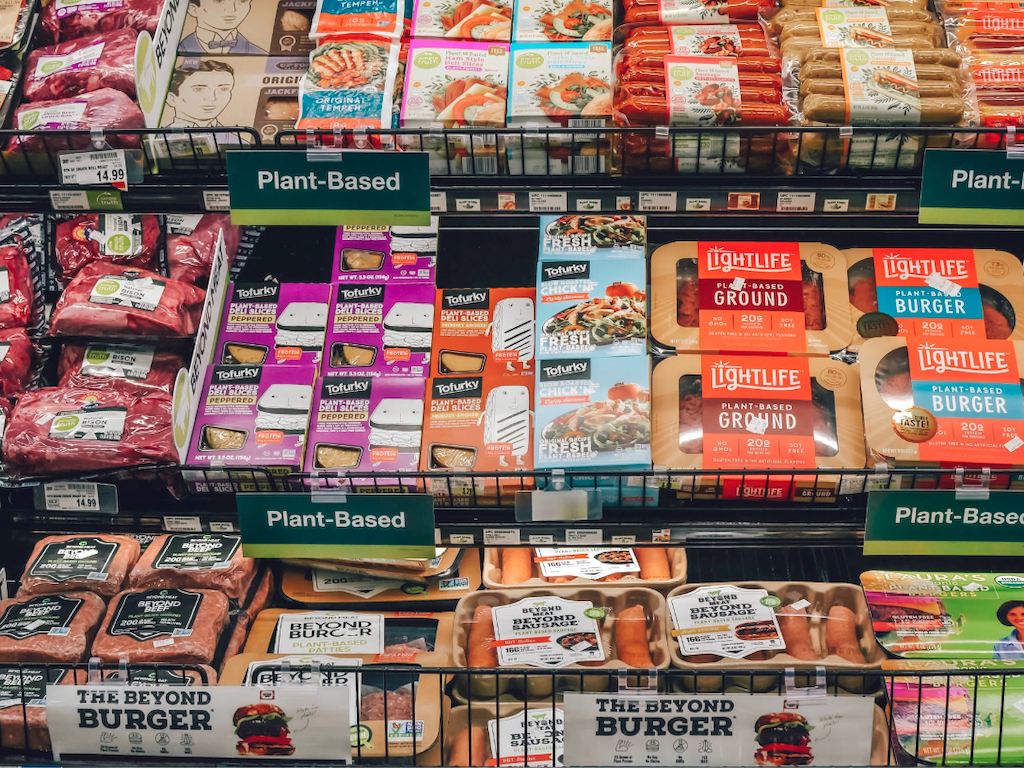3 Mins Read
A new study by U.S. supermarket chain Kroger and trade association Plant Based Foods Association (PBFA) has found that plant-based meat sales increased by 23% when those items were sold in the meat department. The research, which shows that consumers now expect plant-based meat to be placed in the conventional meat section, proves that the sustainable and cruelty-free alternatives are now widely considered mainstream products.
The joint 12-week study involved a simple merchandising change, where Kroger placed all plant-based meat products in a three-foot set within the meat department in 60 of its stores across Colorado, Indiana and Illinois in the U.S. From December last year through February this year, the shift found that plant-based meat purchases soared by 23% when those items were sold within the meat department.
Commenting on the findings, Julie Emmett, senior director of retail partnerships at PBFA said: “This research proves that it is important for retailers to place plant-based meat where shoppers expect to find it: in the meat department. Other retailers are sure to make this change with this new data in hand.”
Back in 2016, California-based food tech darling Beyond Meat was the first 2.0 alternative meat company to launch in retail and to insist that its bleeding burger patties be placed and sold alongside beef patties for their launch at the Pearl Street Whole Foods in Colorado. The company sold out all the plant patties in under two hours. Today, Impossible Foods, the other giant in the meat replacement burger space, also markets its products in supermarket meat aisles.
Read More: Interview with Beyond Meat’s Marketing Maestro
“This test provides one more proof point that plant-based meats have moved from niche to mainstream,” said Kroger merchandising director Sean Brislin, who added that it “demonstrates the viability of shifting product placements to reach even more customers.”
The study also involved shopper interviews, which found that most consumers were interested in plant-based meat alternatives, and common responses included being “excited” and “impressed” by the range of vegan options now available on the market.
These responses reflect the widespread shift amongst consumers globally towards plant-based meat options, particularly in the wake of the coronavirus, which has raised concerns about the health dangers, food safety, sustainability and supply chain issues associated with the meat industry.
Kroger reported that from March to June this year, its plant-based meat customer count had jumped by over 50% compared to the same period last year. The picture is similar across the country, with overall vegan meat sales soaring as much as 280% in March, at the height of the first wave of coronavirus infections stateside.
In other parts of the world, such as Hong Kong and the U.K., consumer surveys have also shown interest in plant-based meat alternatives reaching record-high levels as a direct result of the coronavirus. In South Korea, there has been a tripling of the country’s vegan population and fast-rising numbers of people opting for a flexitarianism, a plant-centric diet that dramatically limits meat intake.
Just last week, the United Nations Food and Agriculture Organisation (FAO) said that altogether, the trend is triggering the biggest global decline in meat consumption in decades.
Environmentalists have been calling for a transition away from the animal-centric food system for years, with the livestock industry alone accounting for as much as 18% of all human-caused greenhouse gas emissions. It is also a land and water intensive industry that in the process drives destructive practices such as deliberate deforestation and water contamination.
Recently, scientists have said that moving away from animal agriculture is key to avoiding future public health emergencies. In a new assessment, experts from the United Nations warned that intensive factory farming and the demand for animal protein are among the leading causes of zoonotic disease emergence.
Lead image courtesy of Kroger.




